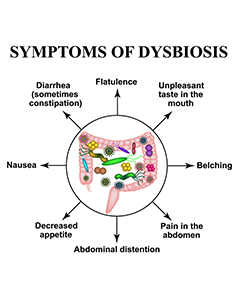
Dysbiosis is an alternative medical condition synonymous with Colitis in orthodox medicine. It refers to multiple imbalances induced between the common beneficial flora found on the walls of the large intestine. This beneficial common flora is collectively referred to as the microbiome. The dysbiosis messes up the balanced microbiome in the large intestine leading to over growth of fungus and harmful bacteria over beneficial bacteria.
Dysbiosis-syndrome
Excessive fungus leads to an excessive release of the toxin aflatoxin which is harmful to the human body. Excessive harmful bacteria leads to the release of bacterial toxins which in turn causes inflammation in the affected organ. Beneficial bacteria become ineffective when outnumbered and overpowered by the other dominating groups. This imbalance has one explanation only: slow unnoticed growing Dysbiosis for years until diagnosed by abdominal palpation or the appearance of severe symptoms.
Benefits of normal Microbiomes in the body:
There are three factors that cause dysbiosis in the large intestine:
The transfer of body fluids infected with yeast between spouses can cause vaginal dysbiosis or urethral dysbiosis.
How to treat Dysbiosis
A person suffering from Dysbiosis symptoms should consult a Naturopath to properly treat the condition. Mishandling the treatment of dysbiosis may lead to further problems. After a careful examination and palpitation of the abdomen, a Naturopath would prescribe a suitable amount of acrylic acid, Borax, Oil of Oregano, Probiotics, and Enzymes. The Naturopath would further prescribe the right anti-fungal diet and colon irrigation therapy.
Testing for Dysbiosis
The best test for Dysbiosis is a comprehensive stool test that studies the digestive tract from the mouth to the rectum.
The main symptoms of dysbiosis are:
Factors that would heighten dysbiosis:
Dietary factors such as the consumption of
Medications such as:
Excessive use of cortisone